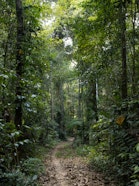Global forests are becoming increasingly fragmented: new Science article co-authored by Pablo Negret
News
Publish date: October 2, 2025

Global forests are becoming increasingly fragmented: new Science article co-authored by Pablo Negret
News
Publish date: October 2, 2025
A new study in Science, co-authored by Pablo Negret of the Wyss Academy for Nature, offers a global assessment of forest fragmentation and shows that the issue is far more widespread than previously recognised. By measuring ecological connectivity instead of relying only on patch size, the research found that more than half of the world’s forests, and up to 80 percent of tropical forests, became more fragmented between 2000 and 2020.
Fragmentation matters because it disrupts ecosystems, isolates species, and undermines forests’ ability to regulate climate. Earlier assessments, which looked only at structural metrics such as patch number and size, suggested fragmentation was declining. This new study overturns that view by revealing a hidden loss of connectivity, making clear that the degradation of forests is advancing much faster than deforestation figures alone suggest.
The patterns differ across regions. In the tropics, shifting agriculture accounts for 61 percent of fragmentation, while forestry dominates in temperate regions and wildfires play a major role in boreal forests. These pressures compound biodiversity loss and weaken the role of forests as carbon sinks, intensifying both local and global climate risks.
The study also points to pathways forward. Tropical forests inside protected areas experienced up to 82 percent less fragmentation than surrounding ones, showing that maintaining connected landscapes can slow the trend.
This perspective connects closely to the Wyss Academy’s Solutionscapes, where research and practice come together to address fragmentation in real-world contexts – from promoting agroforestry in Laos to tackling mining-driven deforestation in Peru and strengthening forest resilience in Switzerland.